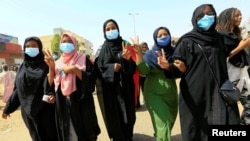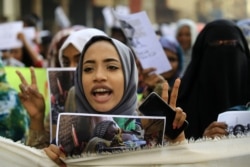Sudan's Ministers Council this week ratified the United Nations' 1979 Convention on the Elimination of All Forms of Discrimination Against Women (CEDAW).
However, the majority-male council declined to endorse the notion that women are equal with men at all political and social levels and have equal rights in marriage, divorce and parenting.
Women's rights groups criticized those reservations, saying they will not accept them.
Ihsan Fagiri, the chief of the initiative No for Women's Repression, said the transitional government tends to lower the ambitions of Sudanese people, and women in particular. She said ratifying the convention with reservations of acts like those in Article 2 contradicts the goal of the convention, as that article concerns equality. The government, she stressed, does not want women to have equality with men in the local legislations.
In late 2018 and early 2019, Sudanese women took prominent roles in public demonstrations against longtime President Omar al-Bashir, who was ousted in April 2019.
Last year, some Sudanese women received international awards for their involvement in the democratic change in Sudan.
The post-Bashir transitional government endorsed some principles of human rights and women's rights last year, but female activists such as Einas Muzamil are doubtful the government is willing to enact real reforms.
Muzamil said ratifying the CEDAW Convention with reservations of three fundamental articles caused anger among women and activist communities. The move fueled skepticism about the government's willingness to make real change in Sudanese women's situations, especially given that the women have equally participated with men in the great December revolution.
Some other Muslim-majority countries such as Saudi Arabia have reserved some acts when ratifying the 1979 convention. The convention gives joining countries the right to carve out some exceptions to the rights spelled out in the document — although not the fundamental rights that Sudan reserved.
Political analyst Waleed Zakaria thinks the transitional government of Sudan is between a rock and a hard place on women's issues.
The transitional government ratified the convention and made reservations on some articles following some other Islamic countries' approach, Zakaria said, as it might be fearing the reaction of the conservative and extremist streams, yet want to improve its image for the international community at the same time.
Meanwhile, the Sudanese government this week also ratified a 2005 protocol on the rights of women in Africa, known as the Maputo Protocol.
The two conventions are expected to be approved by the sovereign council that serves as the current top authority in Sudan.





